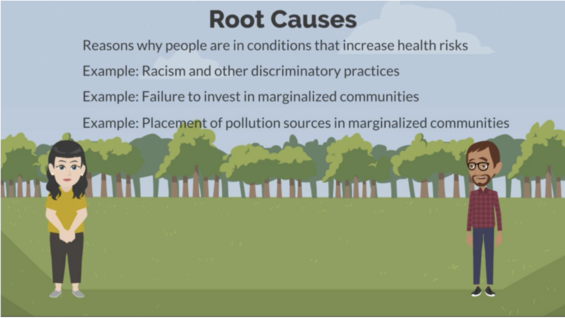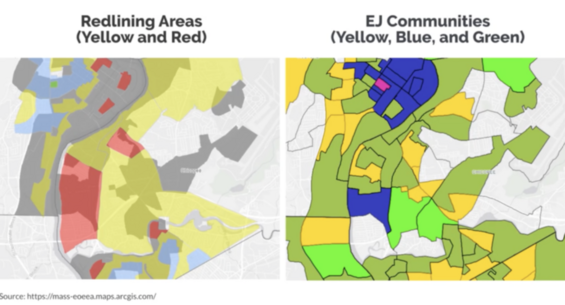The Challenge
Climate change will have the greatest impact on those who face social and/or economic disadvantages. The health impacts of climate change are known to be substantially affected by social determinants, including historical racial injustice. DPH proposed to build capacity in providers and local public health officials that serve vulnerable populations through the development and deployment of training and outreach material on sources of Massachusetts data on climate hazards and health outcomes, for programs providing direct care to vulnerable populations most susceptible to climate-related health impacts.
The training and outreach material developed by DPH presents a key opportunity to evaluate the underlying causes of health inequities by applying racial equity reframing to better identify specific climate hazards and develop an equitable, systematic, and specific response to address them.
Project Scope
Climate and Environmental Health Equity Trainings
During FY23, DPH surveyed, evaluated training needs, and developed educational training modules for Community Health Workers (CHWs) focused on the social determinants of disease, environmental justice, and the health impacts of climate change. CHWs connect clinical practice to the everyday lives of community members and are uniquely positioned to promote health in underserved populations. In addition, their specific community health knowledge has recently generated attention among state and federal agencies engaged in disaster planning and recovery.
In FY23, the DPH Environmental Toxicology Program engaged with the Asthma Prevention and Control Program and the Community Health Worker Program in the DPH Bureau of Community Health and Prevention (BCHAP) to deploy an environmental health needs assessment survey and to customize educational training modules tailored to learning competencies for CHWs. Results of the CHW survey were used to inform the educational needs of CHWs, including identification of topics of interest like climate change and preferred learning formats. The CHW training modules provide an overview of the expected health impacts of climate change in environmental justice communities and use case studies to illustrate exposure to specific climate hazards, such as extreme heat and vector-borne disease. The modules were also developed in anticipation of the continuing educational needs of CHWs (pending implementation of a statewide certification system), covering the role of social determinants of health (SDOH) and environmental justice in community health while offering concrete suggestions (i.e., example adaptations) and educational resources for reducing health impacts and preventing exposure to climate change hazards.
In FY24, DPH, with the input from The Bureau of Climate and Environmental Health leadership, the Office of Health Equity, the Bureau of Community Health and Prevention, and the Communications Office, adapted and improved the Climate and Health Equity training developed in FY23 to reach additional audiences including programs providing direct care to vulnerable populations most susceptible to climate-related health impacts (e.g., community health workers, primary care clinicians), local public health officials, and community based organizations (CBOs). To inform the training improvements and be responsive to a 2023 DPH SHMCAP Action, DPH deployed a needs assessment survey to local health officials across the Commonwealth to assess their climate and health learning needs. To better frame the health equity lens that learners use to understand environmental justice and health disparities in the context of climate change, racial and social inequities were better defined and brought to the forefront of the modules. In addition to better defining and specifically focusing on structural racism, DPH included a tailored and interactive infographic with information on upstream approaches and interventions to the case studies on extreme heat, poor outdoor air quality, recreational water, and vector-born illnesses. Now, learners can learn more about what they can do during climate change events as individuals, community members, health care professionals, and local health officials. Finally, DPH also incorporated more diverse avatars and included more rural scenarios throughout the modules to increase accessibility and relatability for different groups across the Commonwealth.
Given the extensive feedback from programs working with target constituencies and the expansion of the target audiences, it was important for DPH to delay deployment of the trainings on a learning management system until the learning modules were more accessible, comprehensive, and adapted to a larger audience. The final modules are now in the process of being launched in TRAIN for local public health officials and in MassAchieve for CHW’s and other public health professionals. In addition, training modules will be mapped to professional competencies providing incentives for stakeholders, specifically local public health officials, to earn continuing education credits.
Climate Fact Sheets
During FY24, DPH created thirteen one-page fact sheets to accompany the Climate and Health Equity trainings. Each of the climate fact sheets give a brief description of a climate hazard, identifies those who are most at risk of exposure to the climate hazard and/or are most likely to be vulnerable to climate-related health impacts, and highlights interventions and resources to prepare and respond to the climate hazard. The fact sheets were created as a resource for learners completing the trainings to share with their patients and/or community members, but they have also been made publicly available on the DPH Bureau of Climate and Environmental Health (BCEH) website. Currently, the thirteen fact sheets are being translated into fifteen different languages to increase accessibility and reach (to be completed in August). The translations will be available online and for those who take the trainings on TRAIN or MassAchieve.
Prior to development of the fact sheets, DPH used the results of the CHW survey to identify topics of interest and resources that would be of most interest to providers that serve vulnerable populations and address the needs of the community. Before publishing the fact sheets online, they were reviewed internally by the Bureau of Climate and Environmental Health, who works closely with communities, providers, and local health officials, the Office of Health Equity who works closely with local public health officials, and the Communications Office to improve key messaging and ensure the fact sheets are culturally and linguistically appropriate.
The 13 Climate Fact Sheets are listed below:
- Extreme Heat
- Heat and Drought
- Food-Borne Illness
- Mosquitoes and Ticks
- Contact with Cyanobacteria
- Inland and Tidal Flooding
- Water contaminated with Fecal Bacteria
- Poor Outdoor Air Quality
- Wildfires
- Mold
- Shellfish Contaminated with Vibrio Bacteria
- Extreme Weather
- Contaminated Water and Related Hazards
Goal and Intended Resilience Benefits
The goal of the Climate and Health Equity trainings and the Climate Fact Sheets is to increase the capacity and capability of direct care providers and local public health officials across all Commonwealth agencies through expanded deployment of training on the social determinants of health, environmental justice, and climate-related health outcomes. The trainings and fact sheets provide concrete information for actions that individuals, communities, clinicians, and local public health officials may take to proactively protect themselves from climate-related health impacts and provide low-cost interventions that people can implement to plan ahead and stay safe during climate-related events such as extreme heat and poor air quality alerts. Making the factsheets publicly available in multiple languages on Mass.gov increases climate resilience across the Commonwealth.
Metrics
Metrics that will be employed to measure the efficiency of the Climate and Health Equity Trainings are the following:
- Number of Commonwealth staff taking trainings through MassAchieve (once available)
- Number of correct answers to Evaluation Questions following the training
- Number of learners completing training through TRAIN (once available)
- Training feedback from learners
- Follow-up evaluation with learners if contact information is available through training platforms
Metrics that will be employed to measure the efficiency of the Climate Fact sheets are the following:
- Number of hits on fact sheets in English and other languages on the DPH Climate and Health Fact Sheets.
- Number of requests for fact sheets from the Public Health Clearing House
- Number of printed fact sheets handed out at community events
Results
Once the Climate and Health Equity training modules are uploaded onto MassAchieve, they will be available to CHWs, public health and hospital-based workforce at DPH and other Commonwealth employees. In addition to deploying the trainings on MassAchieve, they will also be deployed on TRAIN for local public health officials across Massachusetts. The Climate Fact Sheets will be available on MassAchieve and TRAIN as additional resources to the trainings. All thirteen fact sheets are also currently posted on the DPH BCEH website.
Best Practices and Lessons Learned
Several best practices and lessons learned were identified through completion of the DPH projects, including:
- Engagement and feedback from target audiences and DPH programs that regularly engage with them is critically important for developing educational content and outreach material that is both relevant and actionable
- Translating educational content and outreach materials can increase access to important climate and health messaging for people that are most vulnerable to the health impacts of climate change
- Creating storyboards that emphasize narrative, structure, and conveyance of information for learners in multiple formats is critical for producing high quality trainings
- Customization of training materials using case studies relevant to the learner’s professional role or daily life is important for illustrating specific actions (i.e., interventions) that learners can implement through their work or at home
- Centering health equity by providing local historical examples that illustrate and assess the long-term impacts of structural racism in approaches to climate change and environmental justice issues in Massachusetts today
Project Alignment with ResilientMass Plan Priority Actions
The DPH SFY23 and SFY24 ISA funded projects address DPH Actions for both the 2018 and 2023 State Hazard Mitigation and Climate Adaptation Plans:
2018:
- Support those providing direct care to vulnerable populations
2023:
- Develop Outreach Materials for Climate Change and Health
- Provide Municipal and Local Health Climate Equity Training and Technical Support
In addition, the Climate Fact Sheets related to extreme heat help to support the Multi-Agency Action: Development and Deployment of a Heat Flag System.
Further Action
Once the trainings are deployed on TRAIN and MassAchieve collecting feedback from learners and tracking user utilization will inform necessary updates, future training design, and topics. There is also a need for more research and support on how to acquire accreditation for other groups outside of local public health and providers employed by the Commonwealth.
Depending on the availability of future resources, other next steps for the Climate and Health Equity training include exploring opportunities to make the trainings available to CBOs that could use the trainings in climate workshops and community events.
Future funding would also allow the translation of the trainings and closed captioning making them more accessible to a wider audience furthering climate and health equity goals.
Additional Information and Resources
The two images below are from the Environmental Justice and Social Determinants of Health training module. The images show examples of how historical structural racism is framed and put into the context of environmental justice today in Massachusetts:

